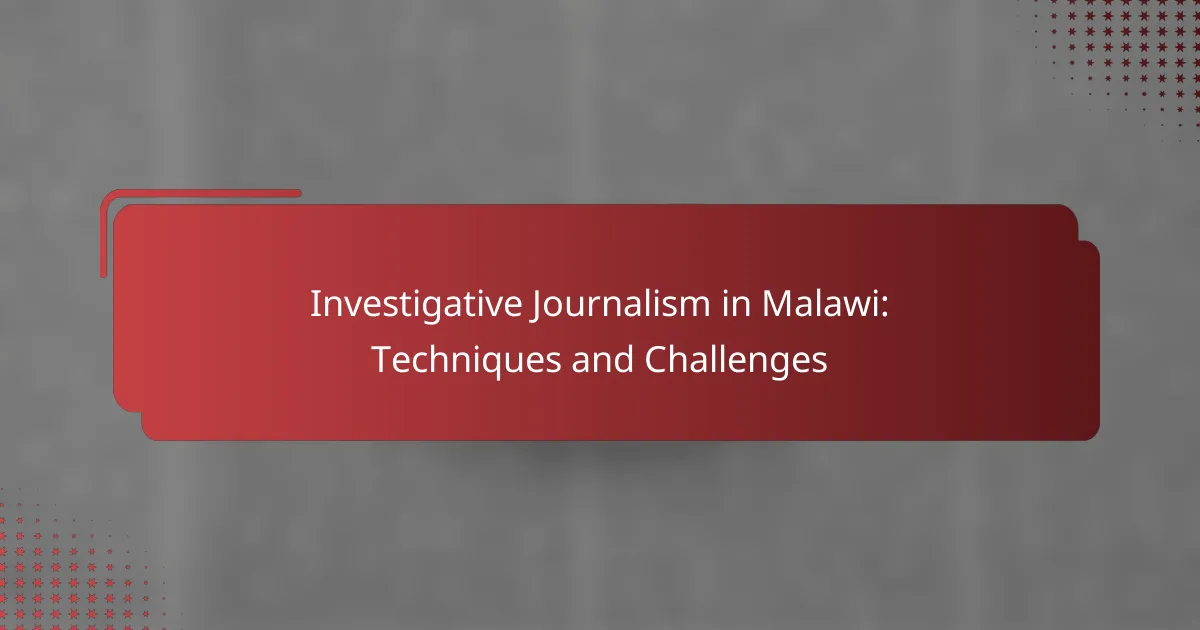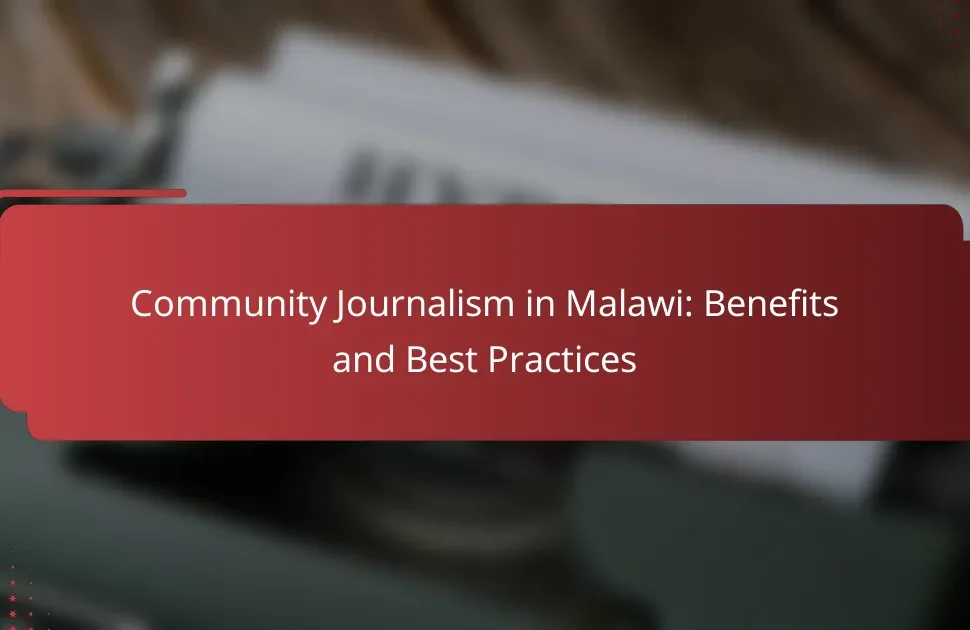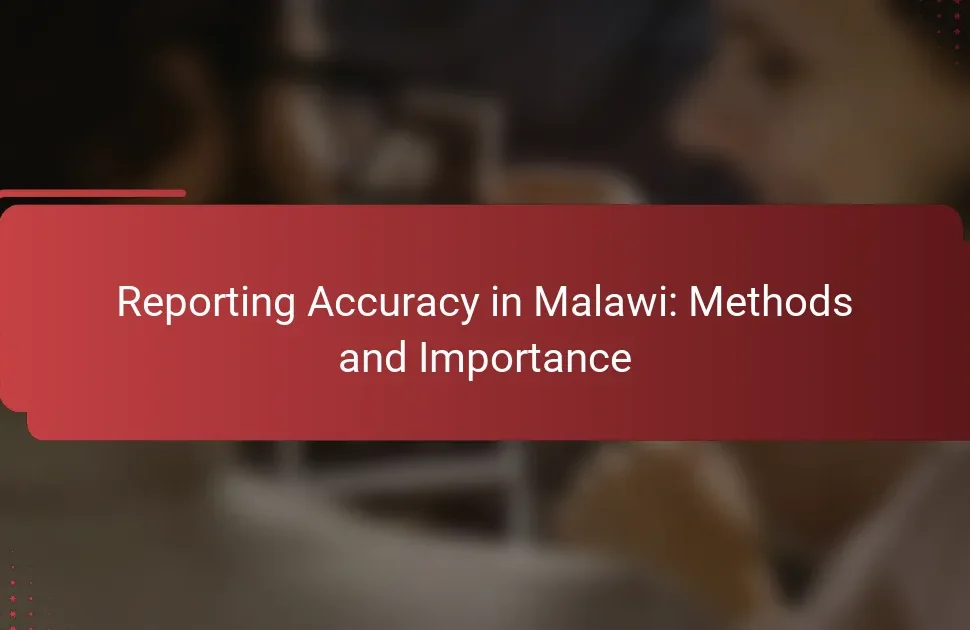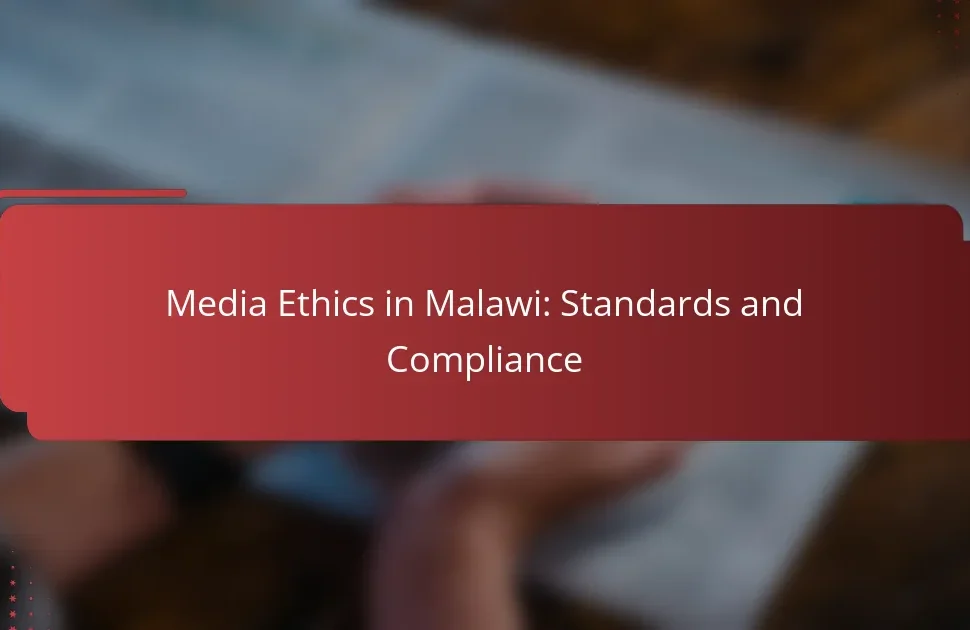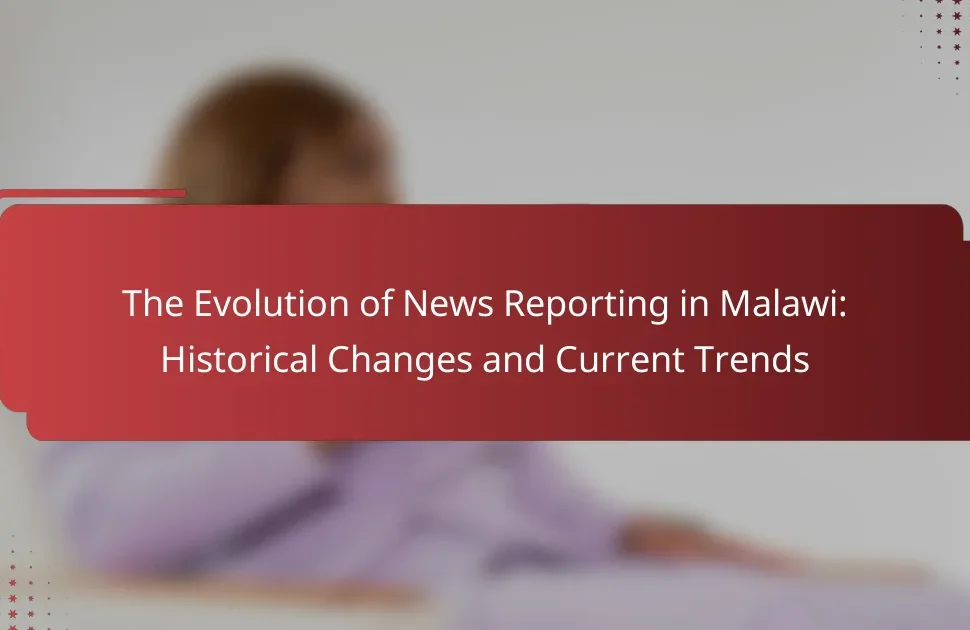Investigative journalism in Malawi is essential for uncovering hidden truths and exposing wrongdoing, significantly contributing to transparency and accountability in governance. Journalists focus on critical issues such as corruption, human rights abuses, and environmental concerns, employing techniques like document analysis, interviews, field research, and data journalism. Despite facing challenges such as government censorship, threats to press freedom, and limited resources, investigative journalism remains a vital force for democracy in Malawi. This article explores the techniques used by investigative journalists and the obstacles they encounter in their pursuit of truth and social change.
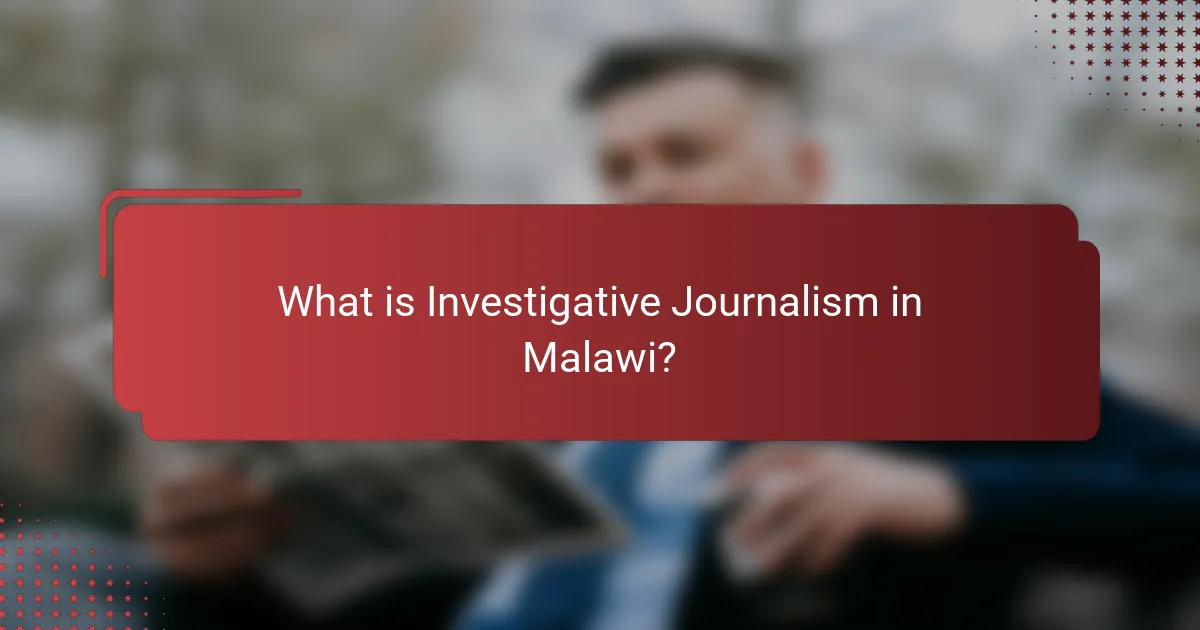
What is Investigative Journalism in Malawi?
Investigative journalism in Malawi is a form of journalism that seeks to uncover hidden truths and expose wrongdoing. It plays a crucial role in promoting transparency and accountability in governance. Investigative journalists in Malawi often focus on issues such as corruption, human rights abuses, and environmental concerns. They utilize various techniques, including in-depth research, interviews, and data analysis. The work of these journalists can lead to significant social change and inform the public about critical issues. For instance, the 2019 investigative report on the misuse of public funds highlighted systemic corruption in government agencies. This type of journalism faces challenges, including threats to press freedom and limited resources. Despite these obstacles, investigative journalism remains vital for democracy in Malawi.
How does investigative journalism differ from traditional journalism in Malawi?
Investigative journalism in Malawi focuses on uncovering hidden truths and exposing corruption, while traditional journalism primarily reports on events and facts. Investigative journalism often involves in-depth research, interviews, and analysis of data. It aims to hold power accountable and bring about social change. Traditional journalism, in contrast, usually covers news stories without extensive investigation. In Malawi, investigative journalism faces challenges such as limited resources and government censorship. Traditional journalism may operate more freely but lacks the depth of investigative work. This distinction is crucial in understanding the media landscape in Malawi.
What are the key principles of investigative journalism?
The key principles of investigative journalism include accuracy, independence, and accountability. Accuracy ensures that all information is verified and factual. This principle is critical as it builds trust with the audience. Independence means journalists operate free from outside influence. This allows for unbiased reporting, which is essential for credibility. Accountability involves journalists being responsible for their work. They must correct errors and be transparent about their sources. These principles guide journalists in uncovering the truth while maintaining ethical standards.
How has the history of journalism in Malawi influenced its investigative practices?
The history of journalism in Malawi has significantly shaped its investigative practices. The colonial era established a foundation of censorship and limited press freedom. Post-independence, journalists faced political repression, which stifled investigative reporting. The introduction of multiparty democracy in the 1990s allowed for greater freedom of expression. This shift led to a resurgence in investigative journalism focused on government accountability. However, challenges remain, such as threats to journalists and limited resources. The legacy of past repression continues to influence current practices, often leading to cautious reporting. Overall, the evolution of journalism in Malawi reflects a complex interplay between freedom and restriction.
Why is investigative journalism important in Malawi?
Investigative journalism is crucial in Malawi for promoting transparency and accountability. It uncovers corruption and abuse of power within government and institutions. This form of journalism helps to inform the public about critical issues affecting their lives. In a country where media freedom is often challenged, investigative reporting serves as a watchdog. It provides a platform for marginalized voices and exposes injustices. Reports from organizations like Transparency International highlight the role of media in fighting corruption. Investigative journalism also encourages civic engagement and informed decision-making among citizens.
What role does it play in promoting accountability and transparency?
Investigative journalism plays a crucial role in promoting accountability and transparency. It exposes corruption and malpractice within government and institutions. By uncovering hidden information, it informs the public about issues affecting them. This form of journalism encourages responsible governance by holding officials accountable for their actions. For example, investigative reports can lead to legal actions against corrupt practices. The exposure of wrongdoing fosters a culture of transparency. In Malawi, such journalism has led to increased public scrutiny of government decisions. This scrutiny can result in reforms and improved policies. Ultimately, investigative journalism empowers citizens to demand better governance.
How does investigative journalism impact public opinion in Malawi?
Investigative journalism significantly influences public opinion in Malawi by exposing corruption and holding power to account. This form of journalism uncovers hidden truths that inform citizens about government actions and societal issues. For instance, reports on mismanagement of public funds have led to public outcry and demands for accountability. Investigative pieces often spark discussions in communities and on social media, shaping perceptions of political leaders. When credible investigations are published, they can lead to protests or calls for policy changes. The Malawi Media Council has noted that impactful investigations increase trust in journalism as a tool for social change. Overall, investigative journalism serves as a catalyst for public engagement and civic responsibility in Malawi.
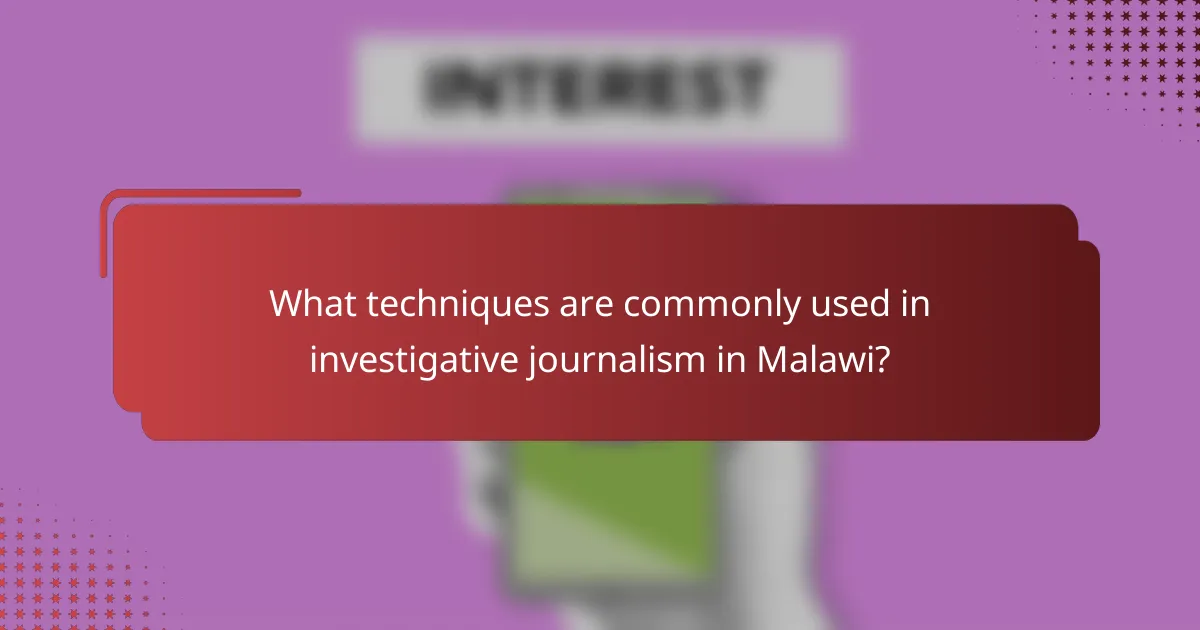
What techniques are commonly used in investigative journalism in Malawi?
Common techniques used in investigative journalism in Malawi include document analysis, interviews, and field research. Document analysis involves scrutinizing public records and official documents to uncover discrepancies. Interviews with sources provide firsthand accounts and insights into issues of public interest. Field research allows journalists to observe events and gather evidence directly from the scene. Additionally, data journalism is increasingly utilized to analyze statistics and present findings visually. Collaborations with local and international organizations enhance resource access and expertise. These techniques collectively contribute to uncovering corruption and holding power accountable in Malawi.
What are the primary research methods utilized by investigative journalists?
Investigative journalists primarily utilize methods such as interviews, document analysis, and field research. Interviews involve speaking directly with sources to gather firsthand information. Document analysis includes reviewing public records, reports, and other written materials for relevant data. Field research entails observing events or situations to gain contextual understanding. These methods help journalists uncover truths and verify claims. For example, a study by the Center for Investigative Reporting highlights that interviews are crucial for obtaining insider perspectives. Document analysis often reveals discrepancies in official narratives, supporting investigative findings. Field research can provide evidence that challenges or corroborates information gathered through other methods.
How do journalists gather and verify information?
Journalists gather and verify information through various methods. They conduct interviews with sources to obtain firsthand accounts. Journalists also utilize public records and documents for factual data. They cross-reference information from multiple sources to ensure accuracy. In Malawi, journalists may face challenges in accessing reliable data. Verification often involves fact-checking against established records or expert opinions. Journalists may also use digital tools for research and verification. These practices help maintain journalistic integrity and credibility.
What role does technology play in investigative journalism?
Technology significantly enhances investigative journalism by providing tools for data collection, analysis, and dissemination. Journalists utilize software for data mining and visualization. This aids in uncovering patterns and trends within large datasets. Additionally, communication technologies facilitate secure information sharing with sources. Tools like encrypted messaging apps protect sensitive communications. Online platforms enable wider audience reach for investigative reports. Social media serves as a channel for real-time updates and engagement. Furthermore, digital forensics assists in verifying documents and multimedia evidence. Overall, technology empowers journalists to conduct thorough investigations and present findings effectively.
How do journalists conduct interviews for investigative pieces?
Journalists conduct interviews for investigative pieces by preparing thoroughly and establishing trust with sources. They begin by researching the topic to formulate relevant questions. This preparation helps them understand the context and nuances of the investigation. During the interview, journalists create a comfortable environment to encourage open dialogue. They often use open-ended questions to elicit detailed responses. Active listening is crucial, as it allows journalists to follow up on interesting points. Additionally, they may record interviews for accuracy. Finally, journalists verify information through cross-referencing with other sources. This method ensures the credibility and reliability of the information gathered.
What strategies are effective for interviewing sources?
Effective strategies for interviewing sources include building rapport, preparing questions in advance, and actively listening. Building rapport creates a comfortable environment for the source. This can lead to more open and honest responses. Preparing questions ensures that the interviewer stays focused and covers essential topics. Active listening allows the interviewer to pick up on cues and follow up on interesting points. Additionally, using open-ended questions encourages detailed responses. Maintaining confidentiality can also increase a source’s willingness to share sensitive information. These strategies enhance the quality of information gathered during interviews.
How do journalists handle sensitive information during interviews?
Journalists handle sensitive information during interviews by prioritizing confidentiality and ethical considerations. They often establish ground rules with interviewees to ensure trust and safety. Journalists may use off-the-record agreements to protect the identity of sources. They assess the potential impact of releasing sensitive information on individuals and communities. Journalists also verify the accuracy of sensitive claims before publication. This approach minimizes harm while maintaining journalistic integrity. Ethical guidelines from organizations like the Society of Professional Journalists emphasize these practices. Adhering to such standards helps ensure responsible reporting in sensitive situations.
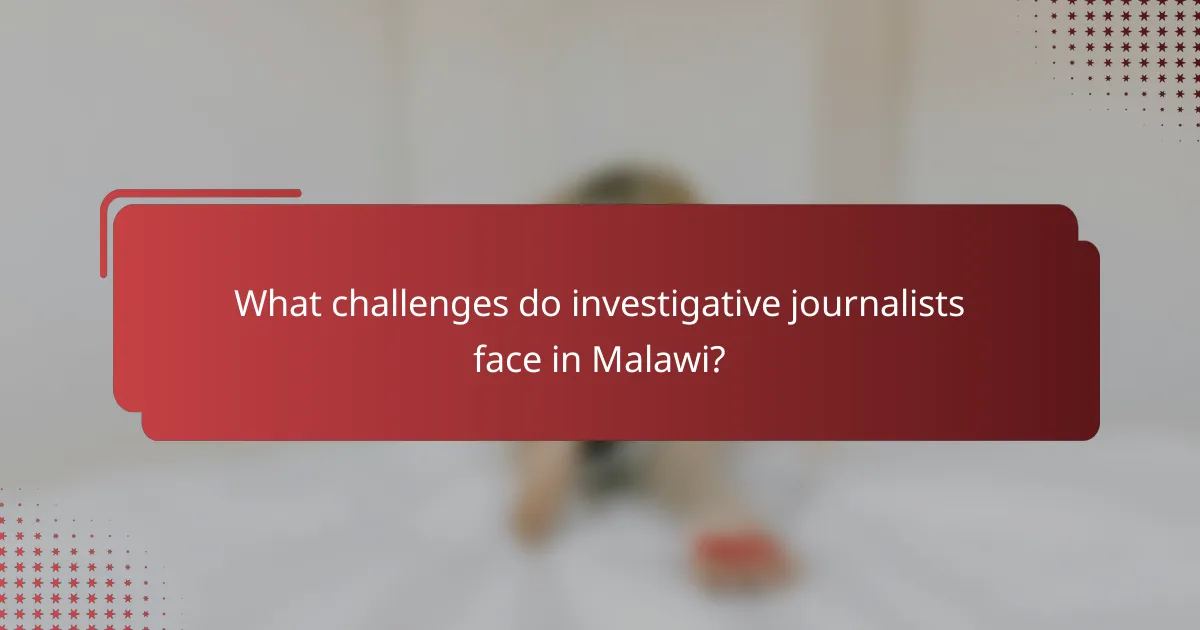
What challenges do investigative journalists face in Malawi?
Investigative journalists in Malawi face significant challenges. These include government censorship and restrictions on press freedom. Journalists often encounter threats and harassment for exposing corruption. Limited resources hinder their ability to conduct thorough investigations. Access to reliable information is frequently obstructed by bureaucratic processes. Additionally, the legal environment can be hostile, with laws that penalize dissent. Economic constraints also affect the sustainability of investigative journalism projects. These factors collectively undermine the effectiveness of investigative reporting in the country.
What are the legal and ethical challenges encountered?
Investigative journalism in Malawi faces significant legal and ethical challenges. These challenges include restrictive laws that limit press freedom, such as defamation laws and regulations on media ownership. Journalists may face legal repercussions for exposing corruption or misconduct, leading to self-censorship. Ethical dilemmas arise when balancing public interest against potential harm to individuals involved in investigations. Additionally, the lack of protection for whistleblowers complicates the pursuit of truth. According to the 2020 World Press Freedom Index, Malawi ranks 75th out of 180 countries, indicating ongoing issues with media freedom. These factors create a challenging environment for investigative journalists in Malawi.
How do laws regarding press freedom affect investigative journalism?
Laws regarding press freedom significantly influence investigative journalism by determining the extent to which journalists can operate without fear of censorship or legal repercussions. In countries with strong press freedom protections, journalists can pursue investigations into corruption and abuse of power more freely. For instance, Malawi’s Constitution guarantees freedom of expression, which supports investigative efforts. Conversely, restrictive laws can lead to self-censorship among journalists, limiting their willingness to expose wrongdoing. In Malawi, the 2016 Access to Information Act aimed to enhance transparency, positively impacting investigative reporting. However, threats of defamation lawsuits and government pressure still pose challenges. Overall, the legal framework directly shapes the environment for investigative journalism, affecting its effectiveness and scope.
What ethical dilemmas do journalists encounter in their work?
Journalists encounter several ethical dilemmas in their work. These dilemmas include balancing the public’s right to know with privacy concerns. They also face challenges in reporting accurately while avoiding sensationalism. Conflicts of interest can arise, especially when journalists have personal ties to their subjects. Additionally, journalists must navigate the pressure to publish quickly versus the need for thorough fact-checking. In Malawi, journalists may contend with government censorship and threats to their safety. These factors complicate their ability to report freely and responsibly. Ethical guidelines from organizations like the Society of Professional Journalists highlight the importance of these considerations.
What are the societal challenges impacting investigative journalism?
Investigative journalism in Malawi faces several societal challenges. Limited access to information hampers journalists’ ability to uncover truths. Political pressure often leads to self-censorship among reporters. Economic constraints limit resources for thorough investigations. Public distrust in media can hinder the effectiveness of journalism. Threats and violence against journalists create a hostile environment for reporting. Legal restrictions, such as defamation laws, pose risks to investigative efforts. These challenges collectively undermine the role of investigative journalism in promoting transparency and accountability.
How does public perception of journalists influence their work?
Public perception of journalists significantly influences their work by shaping the trust and credibility they receive from the audience. When the public views journalists positively, it encourages open communication and collaboration. Conversely, negative perceptions can lead to skepticism and resistance, hindering information flow. For instance, a survey by the Reuters Institute found that in countries with high trust in media, journalists reported greater freedom in their reporting. In contrast, journalists in regions with low public trust faced increased pressure and censorship. Thus, the public’s trust level directly affects journalists’ ability to investigate and report effectively.
What risks do journalists face when reporting on sensitive issues?
Journalists face numerous risks when reporting on sensitive issues. These risks include physical harm, legal repercussions, and psychological stress. In many regions, including Malawi, journalists may face threats of violence from individuals or groups opposed to their reporting. Legal risks can arise from defamation laws or governmental restrictions on free speech. Additionally, the psychological toll of covering traumatic events can lead to mental health issues. According to a report by the Committee to Protect Journalists, over 60 journalists were killed worldwide in 2022 while covering sensitive topics. This highlights the dangerous environment journalists often navigate.
What strategies can be employed to overcome these challenges?
Developing strong networks with local sources is crucial for overcoming challenges in investigative journalism in Malawi. Building trust with informants can lead to valuable information. Training journalists in digital security enhances their ability to protect sensitive information. Collaborating with international organizations can provide resources and support. Utilizing social media platforms helps in reaching broader audiences and gathering insights. Engaging in community outreach fosters public support for investigative efforts. Establishing legal support networks aids journalists in navigating potential legal challenges. These strategies collectively strengthen the capacity of journalists to address challenges effectively.
How can investigative journalists build trust with their sources?
Investigative journalists can build trust with their sources by maintaining transparency and consistency. They should communicate openly about their intentions and the potential risks involved. Regular follow-ups can reinforce reliability and commitment. Journalists must respect confidentiality to foster a safe environment for sources. Demonstrating integrity through accurate reporting builds credibility over time. Engaging in active listening shows sources that their concerns are valued. Providing feedback on how information was used can also strengthen relationships. Trust is essential for effective investigative journalism, as it encourages sources to share sensitive information.
What resources are available for supporting investigative journalism in Malawi?
Resources available for supporting investigative journalism in Malawi include various organizations and funding sources. The Media Institute of Southern Africa (MISA) provides training and support for journalists. The Malawi Chapter of the International Federation of Journalists offers resources for ethical journalism. Additionally, the United Nations Development Programme (UNDP) supports media initiatives through funding. The African Centre for Media Excellence also provides training and mentorship for investigative journalists. These organizations aim to enhance the capacity of journalists in Malawi to conduct thorough investigations.
What best practices should aspiring investigative journalists follow in Malawi?
Aspiring investigative journalists in Malawi should prioritize ethical reporting and thorough research. They must adhere to the principles of accuracy and fairness. Understanding local laws and regulations is crucial to avoid legal issues. Building a network of reliable sources enhances the quality of their investigations. Journalists should also engage in continuous training to improve their skills. Utilizing digital tools for data collection and analysis is increasingly important. Collaboration with other media professionals can provide additional insights and support. Finally, maintaining confidentiality and protecting sources is essential for credible reporting.
Investigative journalism in Malawi is a critical practice aimed at uncovering hidden truths and exposing corruption, thereby promoting transparency and accountability in governance. This article explores the techniques employed by investigative journalists, such as document analysis, interviews, and field research, while also addressing the unique challenges they face, including government censorship and limited resources. Key principles guiding this form of journalism include accuracy, independence, and accountability, which are essential for maintaining credibility. Additionally, the historical context of journalism in Malawi and its impact on investigative practices will be examined, alongside the societal and legal challenges that hinder effective reporting. Overall, the role of investigative journalism in shaping public opinion and fostering civic engagement in Malawi is emphasized.
